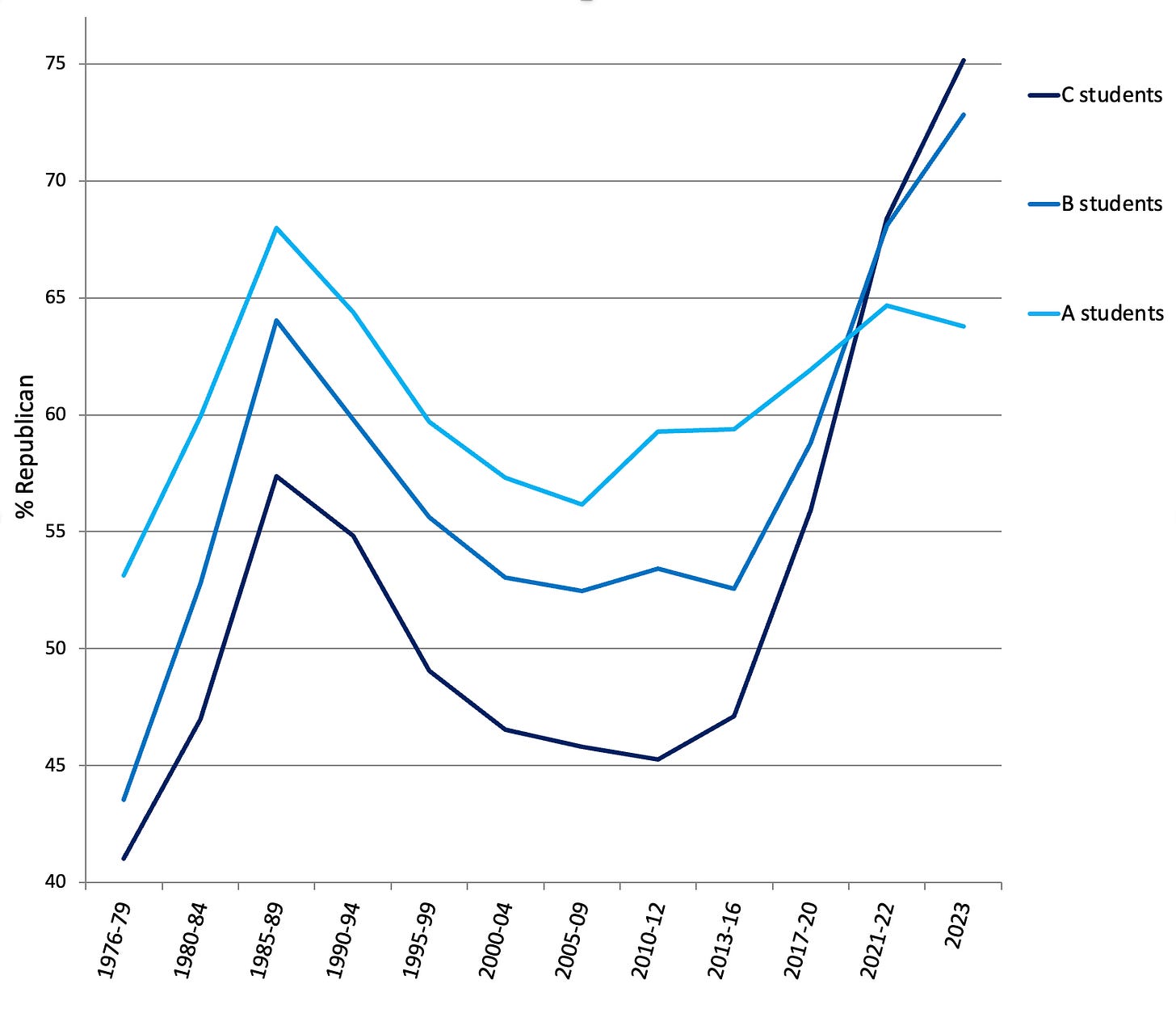Why more young men voted for Trump
And the common denominator among those who shifted to Republicans
In an election full of surprises, one of the biggest was the voting shift among young men. They favored Biden by 15 points in 2020 but went for Trump by 13 points in 2024. That’s a swing of 28 percentage points, an extraordinarily large shift in a political landscape where races are often decided by a few percentage points.
Why did young men move so decisively toward Trump in the past four years? Despite the rumblings about misogynistic online influencers, increasing sexism does not appear to be the cause, according to data from the General Social Survey. Since 2010, young men in the U.S. have become less likely to agree that “Most men are better suited emotionally for politics than are most women.”
Some of the shift is likely rooted in Gen Z’s inherent pessimism, which is never a good thing for the incumbent party. Dissatisfied voters want to vote the bums out in the hope that the next guy will make things better, a fact that goes beyond gender. But other trends reveal the roots of the Republican party’s appeal to a certain type of young man.
During the Obama years, male high school seniors who did and didn’t plan to go to college differed little in their political affiliation. In the years that followed, however, young men who did not plan to go to college became increasingly likely to identify as Republicans. By 2023 – the most recent data available – 77% were Republicans, compared to 59% of those who planned to go to college (see Figure 1). Although the number of Republican young women also increased, the divide by college plans is not nearly as large as among young men.
Figure 1: Percent of high school seniors who are Republican, by college plans and gender. Source: Monitoring the Future. Note: Independents and other party affiliations excluded; compares Republicans vs. Democrats only.
This mirrors the shift toward Republicans among older working-class voters over the same time period. But these young men are 17 or 18 years old, yet to start their adult careers. They don’t yet belong in the category of non-college-educated men, a group whose real wages have declined since the 1970s. They just anticipate being there, and that may have been enough to push them in the direction of Republicans. The Republicans have become the party of the disadvantaged man – and, apparently, even those who merely expect to be disadvantaged.
And it’s not just because these young men’s parents don’t have college degrees. Even if a young man’s father has a four-year college degree, since 2016 he is much more likely to be Republican if he does not plan on getting a college degree himself.
Even more intriguing, young men who have poorer grades in high school have also shifted hugely toward Republicans in the 2020s, after previously being less Republican than those with A averages (see Figure 2). To put it in blunt terms, young men who feel like they’re losing are now more likely to be Republicans. The same is not true among young women, where those with poorer grades are still less likely to be Republicans than those with A averages.
Figure 2: Percent of male high school seniors who are Republican, by average high school grades. Source: Monitoring the Future. Note: Independents and other party affiliations excluded; compares Republicans vs. Democrats only.
“I think a lot of young men had the sense that the Democrats didn’t see them as having problems. They saw them as being the problem,” said Richard Reeves, founder of the American Institute for Boys and Men. “Republicans … were able to claim that the Democrats didn’t care about men—that they’re just obsessed with women’s issues, and that to the extent they thought about men at all, it was in terms of toxic masculinity and patriarchy.”
Nobody wants to be thought of as the problem, but it might be easier to accept a focus on women’s disadvantages If you’re a man with a college degree and a high-paying job. If you’re a working-class man feeling ignored and economically vulnerable, it might feel like piling on. Democrats are complaining about toxic masculinity, they might be thinking, when we’re struggling with real issues like trying to afford groceries after inflation spiked. Even struggling with grades in high school now pushes young men toward being Republicans.
Reeves continued, “Life is not great for men without college degrees in America, and it hasn’t been for the last few decades. A lot of men are worse off than their fathers were. And so I think Republicans spoke to the sense that men are struggling economically and unsure of their place in society.”
Young men are now less likely to graduate from college than young women. Many feel they are being left behind just as they hear the woke left saying they’re the enemy. Unless Democrats can move the focus away from wokeism toward a more moderate focus on bread and butter economic issues, they risk losing the key voting bloc of young adults – particularly young men who feel adrift and disaffected.
I’d love to hear your thoughts on why young men, particularly those who are struggling academically and/or don’t plan on going to college, have shifted toward the Republicans.





The CNN exit poll of 22,000 voters showed men ages 18-29 (Trump 49%) were the LEAST likely of any male group to support Trump: men age 30-44 (Trump 53%), age 45-64 (Trump 60%), age 65+ (Trump 55%) https://www.cnn.com/election/2024/exit-polls/national-results/general/president/0 . Nevertheless, this post raises an important point: the split between young women (61-37%) and young men (47-49%) in Harris-Trump support is a staggering 52 points. Progressives, including Harris, with their vitriolic insults, seem to be doing everything they can to drive young people away.
Another media narrative blown to pieces by real, actual data.